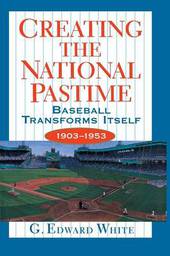
|
Creating the National Pastime: Baseball Transforms Itself, 1903-1953
Paperback / softback
Main Details
| Title |
Creating the National Pastime: Baseball Transforms Itself, 1903-1953
|
| Authors and Contributors |
By (author) G. Edward White
|
| Physical Properties |
| Format:Paperback / softback | | Pages:384 | | Dimensions(mm): Height 235,Width 152 |
|
| Category/Genre | Sport and leisure industries
Baseball |
|---|
| ISBN/Barcode |
9780691058856
|
| Classifications | Dewey:796.35709 |
|---|
| Audience | | General | | Tertiary Education (US: College) | | Professional & Vocational | |
|---|
| Illustrations |
25 halftones
|
|
Publishing Details |
| Publisher |
Princeton University Press
|
| Imprint |
Princeton University Press
|
| Publication Date |
22 February 1998 |
| Publication Country |
United States
|
Description
In this text G. Edward White shows how seemingly irrational business decisions, inspired in part by the self-interest of the owners but also by their nostalgia for the game, transformed baseball into the national pastime. Not simply a professional sport, baseball has been treated as a focus of childhood rituals and an emblem of American individuality and fair play throughout much of the 20th century. It started out, however, as a marginal urban sport associated with drinking and gambling. White describes its progression to an almost mythic status as an idyllic game, popular among people of all ages and classes. He then recounts the owners' concerted efforts, often supported by the legal system, to preserve this image. Baseball grew up in the midst of urban industrialization during the Progressive Era, and the emerging steel and concrete baseball parks encapsulated feelings of neighbourliness and associations with the rural leisure of bygone times. According to White, these nostalgic themes, together with personal financial concerns, guided owners toward practices that in retrospect appear unfair to players and detrimental to the progress of the game. Reserve clauses, blacklisting,
Author Biography
G. Edward White is University Professor and John B. Minor Professor of Law and History at the University of Virginia. His books include The Marshall Court and Cultural Change, 1815-1835 and Justice Oliver Wendell Holmes: Law and the Inner Self.
Reviews"An astute examination of how baseball emerged as the national pastime... Things liven up when [White] looks at the gambling and cheating that were a part of the game early in the century, and when he examines the growth and economic importance of night baseball and of radio and TV broadcasts... Baseball cognoscenti will find plenty to chew on here."--Kirkus Reviews "Mr. White, an affectionate but agreeably dry-eyed student of the game ... is unfailingly interesting about the influence of Hank Greenberg and Joe DiMaggio on American attitudes about ethnicity, on the business culture of an industry in which competitors also are partners, on the evolution of the relationship between major league teams and the journalists who cover them... Mr. White's insights are frequently accompanied by fascinating facts..."--George F. Will, The New York Times Book Review "Remarkable. This is one of the first books about baseball that doesn't confuse the game with the author's lost boyhood, his failure to connect with Dad, or the end of American innocence... one of the most original studies of baseball in years."--Jesse Berrett, LA Weekly "... perceptively examines the ways baseball mirrored a changing American society in the first half of this century...White paints an especially vivid picture of the evolution of the ballpark from a small wooden structure; through the concrete-and-steel boom of 1908-15...White is also strong on the pervasiveness of gambling and game-throwing, and how baseball's barons responded by inventing the rhetoric of its pure, pastoral roots..."--Jeff Z. Klein, New York Newsday "This book should provide real insight into [baseball's] glorious past, and why it is no accident that we remember that past as glorious."--Richard J. Tofel, The Wall Street Journal "[White] is poignant in his description of the decline of the pastoral setting, as a new generation of owners found profit in suburbia. This study represents the best of serious research into American baseball history."--Sol Gittleman, Journal of Interdisciplinary History
|